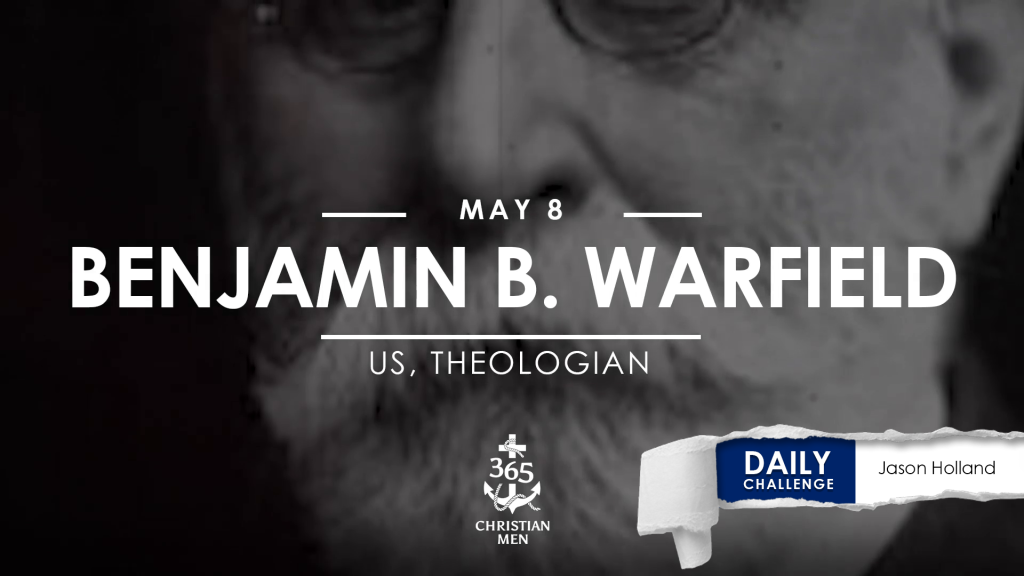May 8. Benjamin Breckinridge Warfield. Warfield was one of the greatest American theologians of the late-nineteenth and early-twentieth centuries. His education spanned two continents, and he could have chosen to teach and travel extensively across the US and throughout Europe, but he chose instead to remain close to home to care for his invalid wife. This decision proved to benefit the church at large, as Warfield penned “a steady stream of articles, reviews, lectures, collections of sermons, and monographs…”
On this date in 1875, after he had spent two years as a student at Princeton, Warfield was licensed to preach. He received his divinity degree a year later.
He became the editor of the Princeton Theological Review and taught at Western Theological Seminary and then at Princeton. Today’s story is set in Warfield’s classroom.
When you’re in a position of power, protect the intimidated.
The commotion of chatter filled Professor Warfield’s lecture hall, and the next class of students quickly made their way to their seats eager to hear Warfield lecture. The professor’s unparalleled intellectual prowess spanned the world of theology, and his agile mind lined up scientific facts with faith.
As the clock struck the top of the hour, Warfield called the lecture hall to order. This collegiate classroom, which had been described as “his domain,” fell immediately silent. In his typically deliberate voice, he greeted the students warmly, and he briefly outlined the agenda. Then he glanced down the student roster and called the first young scholar forward for the customary before-lecture quiz on the assigned reading, which dealt with a question. Do miracles still happen?
The student stood and strode to the front of the room, the leather heels of his congress boots clicking rhythmically across the hardwood floor. As the young man approached, Warfield asked the first question.
The student answered, and Warfield posed another question.
The student paused, then thoughtfully replied to the Professor with his best answer. Yet the longer he spoke, the more his flawed logic revealed a thread of confusion—even doubt—about the meaning of what he’d read. He’d let his understanding of the material be influenced by his own opinion about whether miracles still happen.
With a series of nods, Warfield affirmed the young student and patiently waited for him to finish. With a twinkle in his eye and a knowing smile, he posed another question, his words forming as if they walked on velvet.
The overly confident student floundered, now obviously aware of his problematic answer, and he blushed. One by one his fellow students across the lecture hall leaned in, waiting to see what would happen next.
The student on the hot-spot stammered, shuffled his feet, and hem-and-hawed his way firmly into a conversational corner. The lecture hall was silent.
Finally, Warfield spoke. In the kind, corrective, and inescapably accurate way he always spoke, he said, “Gentlemen, I like the supernatural.” Now he turned and to the entire class.
With a wink and a chuckle, Warfield began shoring up the shortcomings in the young scholar’s thinking, which was rooted in his opinions rather than in Scripture. Warfield guided his students back to the eternal truths he had staked his life and scholarly reputation on:
All of Scripture is inspired by God
It authoritatively exists without need of any additional validation by human opinion or any scientific fact
As the living Word of God, Scripture stands alone, without qualification, as unique among all texts, for all time
By these definitions, the Scriptures are supernatural and miraculous indeed
Warfield paused for a moment to let his words sink in, turned to the quizee, and asked, “Is there any question you would like to ask?”
The student shook his head no. His look of confusion and embarrassment was replaced by a broad smile.
Professor Warfield then turned to the class, as he did at the end of every student’s quiz, and asked, “Has anyone a question?”
“Lead me in your truth and teach me, for you are the God of my salvation,” (Psalm 25:5, ESV).
How could you allow the eternal truth and reliability of God’s Word to impact an area of misbelief in your life today? When you’re in a position of power, protect the intimidated.
“B. B. Warfield.” Banner of Truth. Baneroftruth.org. Accessed August 5, 2020 https://banneroftruth.org/us/about/banner-authors/b-b-warfield/
“B.B. Warfield.” Theopedia. Accessed August 5, 2020.https://www.theopedia.com/bb-warfield.
Waugh, Barry. “Benjamin Breckinridge Warfield.” The Southern Presbyterian Review. Digitization Project:
Author Biography. Accessed August 5, 2020.
https://www.pcahistory.org/HCLibrary/periodicals/spr/bios/warfield.html.
https://www.monergism.com/sermons-and-essays-works-b-b-warfield
https://www.monergism.com/thethreshold/sdg/warfield/Biblical_Doctrines_-_B_B_Warfield.pdf
https://www.monergism.com/sermons-and-essays-works-b-b-warfield
https://img0.etsystatic.com/038/0/5495306/il_570xN.540671698_eln6.jpg
https://www.presbyteriansofthepast.com/2014/12/25/b-b-warfield/
Story read by Daniel Carpenter
Story written by Shelli Mandeville https://worthy.life/





